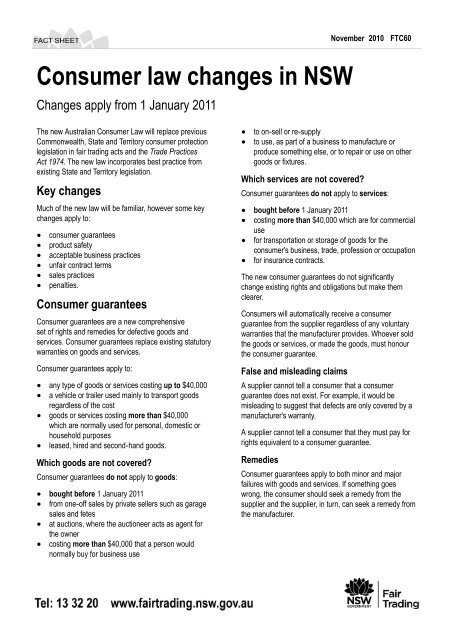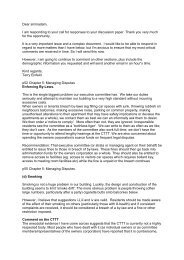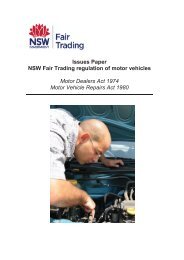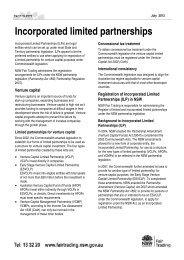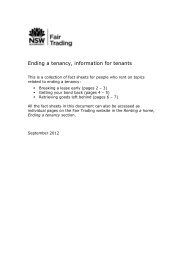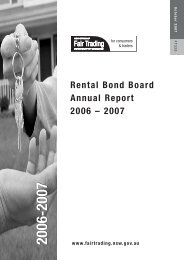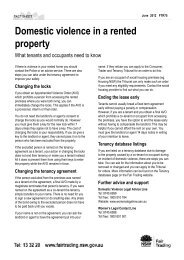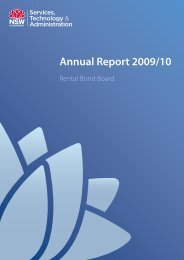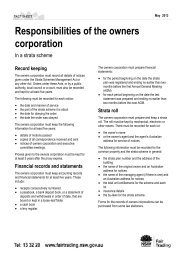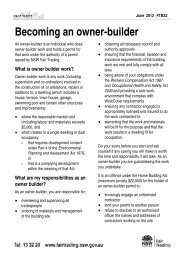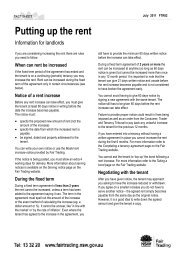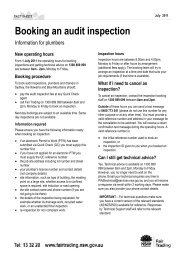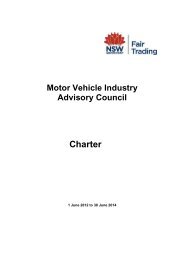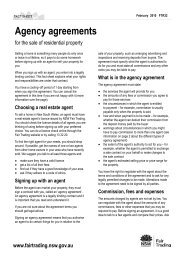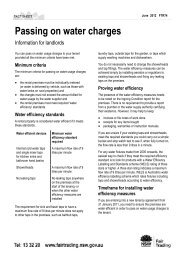Download - NSW Fair Trading
Download - NSW Fair Trading
Download - NSW Fair Trading
Create successful ePaper yourself
Turn your PDF publications into a flip-book with our unique Google optimized e-Paper software.
Consumer law changes in <strong>NSW</strong><br />
Changes apply from 1 January 2011<br />
The new Australian Consumer Law will replace previous<br />
Commonwealth, State and Territory consumer protection<br />
legislation in fair trading acts and the Trade Practices<br />
Act 1974. The new law incorporates best practice from<br />
existing State and Territory legislation.<br />
Key changes<br />
Much of the new law will be familiar, however some key<br />
changes apply to:<br />
● consumer guarantees<br />
● product safety<br />
● acceptable business practices<br />
● unfair contract terms<br />
● sales practices<br />
● penalties.<br />
Consumer guarantees<br />
Consumer guarantees are a new comprehensive<br />
set of rights and remedies for defective goods and<br />
services. Consumer guarantees replace existing statutory<br />
warranties on goods and services.<br />
Consumer guarantees apply to:<br />
● any type of goods or services costing up to $40,000<br />
● a vehicle or trailer used mainly to transport goods<br />
regardless of the cost<br />
● goods or services costing more than $40,000<br />
which are normally used for personal, domestic or<br />
household purposes<br />
● leased, hired and second‑hand goods.<br />
Which goods are not covered?<br />
Consumer guarantees do not apply to goods:<br />
● bought before 1 January 2011<br />
● from one‑off sales by private sellers such as garage<br />
sales and fetes<br />
● at auctions, where the auctioneer acts as agent for<br />
the owner<br />
● costing more than $40,000 that a person would<br />
normally buy for business use<br />
November 2010 FTC60<br />
● to on‑sell or re‑supply<br />
● to use, as part of a business to manufacture or<br />
produce something else, or to repair or use on other<br />
goods or fixtures.<br />
Which services are not covered?<br />
Consumer guarantees do not apply to services:<br />
● bought before 1 January 2011<br />
● costing more than $40,000 which are for commercial<br />
use<br />
● for transportation or storage of goods for the<br />
consumer's business, trade, profession or occupation<br />
● for insurance contracts.<br />
The new consumer guarantees do not significantly<br />
change existing rights and obligations but make them<br />
clearer.<br />
Consumers will automatically receive a consumer<br />
guarantee from the supplier regardless of any voluntary<br />
warranties that the manufacturer provides. Whoever sold<br />
the goods or services, or made the goods, must honour<br />
the consumer guarantee.<br />
False and misleading claims<br />
A supplier cannot tell a consumer that a consumer<br />
guarantee does not exist. For example, it would be<br />
misleading to suggest that defects are only covered by a<br />
manufacturer's warranty.<br />
A supplier cannot tell a consumer that they must pay for<br />
rights equivalent to a consumer guarantee.<br />
Remedies<br />
Consumer guarantees apply to both minor and major<br />
failures with goods and services. If something goes<br />
wrong, the consumer should seek a remedy from the<br />
supplier and the supplier, in turn, can seek a remedy from<br />
the manufacturer.
Minor problems can normally be put right. Major<br />
problems are ones that cannot be fixed or are too difficult<br />
to fix.<br />
For minor problems the supplier can choose to:<br />
● repair<br />
● replace or<br />
● refund.<br />
For major problems the consumer can choose:<br />
● a refund<br />
● a replacement or<br />
● compensation.<br />
When seeking a remedy, consumers are not required to<br />
return the goods to the supplier in the original packaging.<br />
'No refund' and other signage<br />
Signs that state 'no refunds' are unlawful, because<br />
they imply it is not possible to get a refund under any<br />
circumstance - even when there is a major problem with<br />
the goods or service.<br />
For the same reason, the following signs are also<br />
unlawful:<br />
● 'No refund on sale items'<br />
● 'Exchange or credit note only for return of sale item'.<br />
Signs that state 'No refunds will be given if you have<br />
simply changed your mind' are acceptable.<br />
Warranties and consumer guarantees<br />
A supplier or manufacturer has to honour all warranties<br />
and consumer guarantees.<br />
Common types of voluntary warranties include an<br />
express warranty, a warranty against defects/<br />
manufacturer’s warranty and an extended warranty.<br />
Product safety<br />
The Australian Consumer Law includes a national<br />
product safety regime. <strong>NSW</strong> <strong>Fair</strong> <strong>Trading</strong> and the<br />
Australian Competition and Consumer Commission<br />
(ACCC) have specific product safety roles under the law<br />
which are summarised below.<br />
Mandatory reporting requirements<br />
November 2010 FTC60<br />
Suppliers must notify the ACCC within 2 days of<br />
becoming aware that a consumer good or product related<br />
service they have supplied has, or may have, caused<br />
serious injury, illness or death.<br />
Safety warnings, bans and recalls<br />
Both the Commonwealth Minister and <strong>NSW</strong> <strong>Fair</strong> <strong>Trading</strong><br />
Minister can issue safety warning notices and interim<br />
bans in <strong>NSW</strong>. Interim bans last for 60 days and may be<br />
extended to allow further investigation.<br />
Only the Commonwealth Minister can impose permanent<br />
bans. Any ban imposed by the Commonwealth applies<br />
throughout Australia.<br />
Compulsory recalls<br />
Both the Commonwealth Minister and <strong>NSW</strong> <strong>Fair</strong> <strong>Trading</strong><br />
Minister can issue a compulsory recall notice for<br />
consumer goods that:<br />
● will or may cause injury<br />
● do not comply with a mandatory safety standard, or<br />
● are banned.<br />
Mandatory safety standards<br />
Only the Commonwealth Minister can make mandatory<br />
safety standards that set specific requirements for<br />
consumer goods or product related services.<br />
Any standard made by the Commonwealth applies<br />
throughout Australia.<br />
For more information, visit the national product safety<br />
website www.productsafety.gov.au<br />
Acceptable business practices<br />
Some rules around business practices have<br />
changed under the law. A summary is listed below.<br />
Proof of transaction<br />
Suppliers must provide proof of a transaction to<br />
consumers for goods or services:<br />
● valued at $75 or more (as soon as practicable)<br />
● valued under $75 within 7 days, if requested by the<br />
customer.
Proof could include a tax invoice, cash register receipt or<br />
a handwritten receipt.<br />
Itemised bills<br />
A consumer can ask a supplier for an itemised bill for<br />
services. This request must be made within 30 days of<br />
whichever happens later:<br />
● the services are supplied, or<br />
● the consumer receives a bill or account from the<br />
supplier for the supply of the services.<br />
The itemised bill must be:<br />
● provided without charge<br />
● provided within 7 days of the request<br />
● expressed in plain language, legible and clear.<br />
False or misleading representations<br />
A number of changes or additions apply to the existing<br />
law on false or misleading representations. When<br />
providing goods and services it is unlawful to make:<br />
● false or misleading testimonials<br />
● false or misleading representations about consumer<br />
guarantees.<br />
Offering rebates, gifts, prizes etc<br />
Suppliers should provide rebates, gifts or prizes as<br />
described to the consumer within the time stated in the<br />
offer, or if no time is stated within a reasonable time.<br />
Supply after accepting payment<br />
If the supplier accepts payment, the goods or services<br />
should be supplied to the consumer as described and<br />
within the specified time, or if no time is specified, within<br />
a reasonable time.<br />
Unfair contract terms<br />
Unfair contract terms provisions introduced in July 2010<br />
become part of the Australian Consumer Law on 1<br />
January 2011.<br />
The law applies to standard form consumer contracts<br />
for the supply of goods and services, or for the sale or<br />
November 2010 FTC60<br />
grant of an interest in land, to an individual for personal,<br />
domestic or household use.<br />
It does not apply to business‑to-business contracts. Most<br />
insurance contracts are not covered.<br />
The unfair contract terms provisions do not apply to<br />
terms that:<br />
● describe the goods, services or land that a consumer<br />
has agreed to buy<br />
● set the upfront price payable under the contract,<br />
provided the price is disclosed before the contract is<br />
entered into<br />
● are required or permitted by law.<br />
Sales practices<br />
Some rules for sales practices will change. A summary of<br />
the changes is outlined below.<br />
Unsolicited consumer agreements<br />
New rules apply to unsolicited consumer agreements for<br />
goods and services.<br />
The rules apply if negotiations are with a telemarketer<br />
or a salesperson at a location other than the supplier’s<br />
premises, the consumer did not invite the telemarketer or<br />
salesperson and the transaction is more than $100 or the<br />
value cannot be established.<br />
The following is not considered an invitation to supply:<br />
● requesting a quote<br />
● giving a dealer contact details for another purpose<br />
such as a competition<br />
● contacting a supplier in response to an unsuccessful<br />
telephone call or visit.<br />
Permitted hours<br />
The permitted hours in which a telemarketer or<br />
salesperson can call have changed. Under the law<br />
sellers cannot visit or call on:<br />
● weekdays - before 9am or after 6pm (after 8pm for<br />
phone calls)<br />
● a Saturday – before 9am or after 5pm<br />
● a Sunday or public holiday.
Contract and cooling‑off period<br />
If a consumer agrees to buy something from<br />
a telemarketer or salesperson, they must be given a<br />
written copy of the contract and be informed of the<br />
cooling‑off period.<br />
A 10-business day cooling‑off period now applies, during<br />
which consumers can cancel a purchase without penalty.<br />
Payment and supply of goods and services<br />
The new rules do not allow a supplier to supply any<br />
goods or services, or accept or require payment, during<br />
the cooling‑off period.<br />
To give businesses time to adjust, for the first 12 months<br />
of the ACL, a supplier can choose to:<br />
● comply with the ACL or<br />
● comply with the previous <strong>NSW</strong> law under which<br />
businesses must not collect any fees during the<br />
cooling‑off period for services supplied during that<br />
period.<br />
Exemptions<br />
Unsolicited consumer agreement laws do not apply to:<br />
● business contracts<br />
● party plan events<br />
● renewing an existing contract.<br />
Unsolicited goods and services<br />
A consumer who receives unsolicited goods or services<br />
does not have to pay for them. Or for any loss or damage<br />
due to supply of a service.<br />
Penalties<br />
The maximum criminal penalties are significantly higher<br />
than those which previously applied.<br />
The maximum penalty is $1.1 million for a body corporate<br />
and $220,000 for an individual. New pecuniary penalties<br />
will apply for the same amount.<br />
www.fairtrading.nsw.gov.au<br />
<strong>Fair</strong> <strong>Trading</strong> enquiries 13 32 20<br />
TTY 1300 723 404<br />
Language assistance 13 14 50<br />
This fact sheet must not be relied<br />
on as legal advice. For more<br />
information about this topic, refer to<br />
the appropriate legislation.<br />
November 2010 FTC60<br />
Which parts of the <strong>Fair</strong> <strong>Trading</strong> Act<br />
still apply?<br />
The <strong>Fair</strong> <strong>Trading</strong> Act will still operate in relation to<br />
important provisions not contained in the ACL, including:<br />
● functions and powers of the Director‑General<br />
● legal assistance<br />
● powers of investigators<br />
● industry‑specific regulation.<br />
Purchases before 1 January 2011<br />
Transactions that take place before 1 January will<br />
continue to be covered by the previous legislation after 1<br />
January 2011.<br />
For example, goods sold on 24 December 2010 will be<br />
covered by the existing statutory warranties, not the new<br />
consumer guarantees.<br />
Who enforces the law?<br />
The Australian Consumer Law is jointly enforced by:<br />
● <strong>NSW</strong> <strong>Fair</strong> <strong>Trading</strong> and other State and Territory fair<br />
trading agencies<br />
● Australian Competition and Consumer Commission<br />
(ACCC)<br />
● Australian Securities and Investments Commission<br />
(ASIC) (for financial goods and services).<br />
© State of New South Wales through <strong>NSW</strong> <strong>Fair</strong> <strong>Trading</strong><br />
You may freely copy, distribute, display or download this information with<br />
some important restrictions. See <strong>NSW</strong> <strong>Fair</strong> <strong>Trading</strong>'s copyright policy at<br />
www.fairtrading.nsw.gov.au or email publications@services.nsw.gov.au


